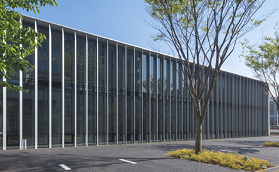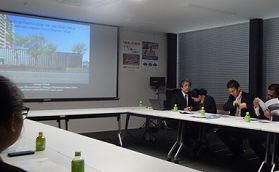
2. SUMMARIES OF REMARKS, PRESENTATIONS, AND SITE VISIT
Mr. Kenji Kato, Deputy Director, International Affairs Office, METI, Japan made an opening remark. He talked about the importance of EE&C policy including BEC, and he expects this workshop to be fruitful for respective participants. He expressed his expectation that Japan continuously will conduct similar programs and cooperation for ASEAN member states. He also stressed the importance of showing the outcome from every program in each participating country to see the next program.
Mr. Jiro Sogawa, Managing Director, ECCJ opened the Workshop. In his opening remark, he expressed a great pleasure in welcoming all the participants in the Workshop. He pointed out the objectives and encouraged everyone to participate actively in the discussion to come up with actionable outputs of the ECAP14 Workshop. He had concluded his remark with expressed appreciation for METI, ACE, guest speakers, participants, and other related parties who contributed to the realization of the workshop.

Mr. Atchariya Jangchay, representative of ASEAN Centre for Energy(ACE), warmly welcomed all delegates to the Workshop. He expressed his gratitude to METI and ECCJ for continuous support given to ACE and ASEAN Member States. He emphasised the objectives and wished everyone a productive workshop on Building Energy Efficiency.
Keynote Lecture
Mr. Yoshitaka Ushio, senior adviser, ECCJ, presented the topic on “EM System in Japanese EC Act” and “Energy conservation benchmark system in Japan” including analyzed status in commercial sector and proposed benchmark standard of hotels, etc. According to Mr.Ushio, it became difficult from a certain phase to continue decreasing the energy consumption intensity by 1% or more in yearly average in industry sector of Japan. In consideration of this situation, the benchmark system was introduced in Japan. At the same time due to the difficulty of establishing EE&C target of the commercial sector, the benchmark system was supposed to be useful. AMSs are expected to learn Japanese introduction process to customize it in conformance with their own country’s situation.
Lectures by Japanese Experts
Ms. Akiko Masaki, Director for Building and Environment Coordination, City of Yokohama, gave her lecture on “BEC implementation situation in Japan”. She explained Building Energy Efficiency Act and its application, energy efficiency standards compliance in buildings subject to notification, and activities to realize energy efficiency in buildings that are not subject to notification. Her presentation highlighted the issues and actions for realizing energy efficiency in buildings, regarding “notification subjects” and “not subject to notification” under the Building Energy Efficiency Act. According to her, major elements of the activity were raising awareness of the construction owner about the new system, increasing the number of Yokohama city staff to fulfill the needs, and trying to treat failed applicants in a nicely manner etc.
Mr. Takashi Uchida, Manager, Promotion department of Energy Saving, Japan ERI Co LTD. gave his lecture on “Construction confirmation application after the implementation of BEC”. He explained “Japanese new BEC with regard to the two calculation systems of BEI (Building Energy Index) and comparison of old BEC”, “ERI’s activity before and after new BEC”, “ERI’s evaluation system”, and “numerical statements prepared after construction starts”. According to the lecture of Mr. Uchida, the subject cases of evaluation of energy consumption performance compatibility increased so much after April 2017 when new Building Energy Code was enforced. It was found to be more important to recognize the adequate placement of engineers who can deal with engineering matters related to architecture, M&E and electrical facilities. The company struggled to match those situations by various measures to find a successful situation in Japan.
Mr. Hajime Moroo, Manager, Technology General Division, AGC Asahi Glass / Jase-W, delivered his lecture on “ZEB Family concept”. He suggested additional guideline for ASEAN Energy Award. He emphasized the importance of setting reasonable baseline and target, feasible plan for continuous energy management & monitoring system, and clearing step by step roadmap to realize ZEB in the future. Lastly, he also introduced ZEB Family Concept in Japan, including definition and evaluation methods of ZEB Family.

Keynote Lecture by Mr.Hajime Moroo from Jase-W
Mr. Yoshitaka Ushio, senior adviser, ECCJ, presented the topic on “EM System in Japanese EC Act” and “Energy conservation benchmark system in Japan” including analyzed status in commercial sector and proposed benchmark standard of hotels, etc. According to Mr.Ushio, it became difficult from a certain phase to continue decreasing the energy consumption intensity by 1% or more in yearly average in industry sector of Japan. In consideration of this situation, the benchmark system was introduced in Japan. At the same time due to the difficulty of establishing EE&C target of the commercial sector, the benchmark system was supposed to be useful. AMSs are expected to learn Japanese introduction process to customize it in conformance with their own country’s situation.
Site Visit (Takenaka Higashi-Kanto Branch Building)
A half-day tour to Takenaka Corporation Higashi-Kanto Branch Office Building was arranged for the participants. It is famous for practical renovation for net-ZEB and is “MLIT Sustainable Building Leader Award winner”.
The key words for net-ZEB technologies were as follows;
(1) The value of comfort; Optimal light environment using nature light for office spaces, Automatic external blind control, Automatic natural ventilation opening control, Personal diffuser units, Desiccant air-conditioning for low humidity, Natural light through skylight
(2) Super energy saving; Ceiling LED lamps, Enhanced thermal insulation using high-insulation glass and performance of existing frames, Adoption of double skin structure, Automatic external blind control to adjust sunlight, Radiation air-conditioning, Geothermal heat utilization, Solar heat utilization
(3) Work smart; Communication area, Shared outlets for equipment, Reduction of environmental load, Wellness control by the use of wearable terminals at workplace
(4) Disaster resistance; Solar power generation panels, Solar heat collection panels, Lithium ion rechargeable batteries
As a result of various practical renovation above, it achieved significant energy conservation. It is important to plan and execute comprehensive thinking about energy benefit, improvement of workplace productivity by improving work space recognition and comfort, improvement business continuity plan, increase of energy cost in the future, improvement of asset value of building.

Takenaka Higashi-Kanto Branch Building

Lecture at Takenaka Higashi-Kanto Branch Building
Country Report
Participants presented Country Reports which were prepared in advance for the workshop on the status and potential issues of BEC/GBC in respective countries, which included the following topics:
– Present status and future task of BEC /GBC in respective countries
– Present status and future task of ASEAN Energy Award
Brunei Darussalam
Mr. Asrul Sany Mohammad Ali, Chief Technical Assistant / Research, Energy and Industry Department, Prime Minister‘s Office, explained the following items in his country report presentation: (1) EC Law, Regulation (Brunei Energy White Paper) on Key Performance Indicator (KPI) to reduce the energy intensity to 45% by 2035 through EE&C initiatives, (2) EE&C on Energy Management System on the development of EM Policy including 4 steps, (3) Supporting Activities on reduction of energy consumption in government building, street lighting saving initiative, (4) Energy Manager Training and Certification Plan on the 3 steps of “Making an arrangement and seeking advices from international experts in 2017” and “Train Energy Manager in 2017” and “Train the Trainers in 2018”.
Cambodia
Mr. Tim Bunthoeurn, Officer, Ministry of Mines & Energy (MIME) explained in his Country Report presentation that there are no application for Green Building except for some modern buildings, and no Energy Conservation Act nor regulations. However, various activities would effectively work to improve the situation, such as Energy Efficiency Policy for Building (EEPB). Strategies in EEPB are awareness raising, capacity building, financial incentives, standards(BEC and MEPS of appliances. He also mentioned target reduction of respective EEPB activities.
Indonesia
Mr. Catur Wahyu Prasetyo Kunaefi, Head of Energy Conservation Cooperation Section, Ministry of Energy and Mineral resources, presented in his Country Report that the commercial buildings in Indonesia are still performing with poor energy efficiency in comparison with Japan, but EE programs for building sector are carried out steadily, including formulating EE standards for buildings, energy conservation partnership program, energy monitoring system (SME), and capacity building for energy managers. He also explained the categories and number of the participants and winners of national energy efficiency awards (PEEN).
Lao PDR
Mr. Xaysavanh Latthachack, Deputy head of division, Ministry of Energy and Mines (MEM), explained step by step EE&C activities of legislation tool including National Policy on EE&C, Prime minister decree on EE&C, Master plan on EE&C, Ministerial Degree and Guidelines. Energy Management, BEC, S&L System and Energy Efficiency in Industry as explained in the three year action plan for EE&C. Furthermore, he also stated the future plans of BEC, i.e. standard development, dissemination, best practices guidelines/manuals development, capacity building, energy code support, market mechanism for code implementation, and developing independent certifying agencies.
Malaysia
Mr. Ahmad Firdaus Kamarazaman, Executive, Energy Commission Malaysia explained BEC, GBC and AEA. Uniform Building By-Laws (UBBL) started in 1984 and was amended in 2012. National Building Energy Labelling (NBEL) for government buildings will be the first move to assist government buildings to be certified as Green Building. Green Rating Tools of GBC has GBI Rating according to a point and My CREST (Malaysian Carbon Reduction & Environmental Sustainability Tool) Rating according to a score dividing design, construction and operation & maintenance. He explained “Asean Energy Awards 2017” and “National Energy and Green Technology Awards 2018. He also stated the proposals for AEA which are “dividing evaluation criteria into sub-criteria” and “converting individual judges’ scores into at-par scores”.
Myanmar
Ms. Naing Naing Linn, Director, Energy Efficiency & Conservation Division, Ministry of Industry, in the Country Report, explained the status of developed EE&C policy/strategy, drafted National Building Code, Criteria for BEC/GBC, Energy Efficiency Regulation for buildings, etc. The provisions of Building code shall apply to the construction, alteration, movement, enlargement, replacement, repair, equipment, use and occupancy, location, maintenance, removal and demolition of every building or structure or any appurtenances connected or attached to such buildings or structures, under seven sections. “Judgement Criteria of EE Regulation in Building Sector under EC Law Draft, 2017” was stated according to two categories under ministerial decree. “Comparison/ difference between National Building Code and Energy Efficiency Building Guideline, Energy Efficient Building Code” was also explained. As the issues and challenges to implement BEC/GBC, she stated regulation or enforcement, lack of practices or awareness, Practical Trainings and financial constraints.
Philippines
Mr. Ponesto Artemio Habitan, Oic-Division Chief, Department of Energy, explained current status and awareness of “issues on BEC/GBC handled by DOE (Department of Energy) and DPWH (Department of Public Works and Highways)” and “issues on the operation of domestic Energy Award System in respective countries and ASEAN Energy Award”. Issues on implementation of Building Energy Efficiency (BEE) is finalization of the proposed policy bridge and development of the implementing regulations. Issues on Philippine GBC lacks capacity building for city and municipal building officials, nationwide awareness campaign programs for relevant stakeholders – i.e., professional associations, architectural & engineering firms, academe, LGUs, building constructors and developers, etc. He also explained current status and awareness of issues on the operation of domestic Energy Award System.
Singapore
Mr. Toh Eng Shyan, Director, Green Mark Department (Existing Buildings), Building and Construction Authority (BCA), presented on Singapore’s green building energy efficiency standards. BCA Green Mark for Existing Non-Residential Buildings 2017 (GM ENRB:2017) launched for piloting in 2017 on energy monitoring, demand control, integration & analytics, occupant comfort, and indoor air quality. It encourages Energy Performance Contract (EPC) by EPC firms accredited by the Singapore Green Building Council (SGBC). Measurement & Verification (M&V) for VRF Systems shows that poor Installation (location of outdoor, heat exchange, etc.) lead to poor performance & breakdown of air conditioners. Introducing M&V system for VRF systems can help to improve system efficiency through optimisation measures.
Thailand
Ms. Kulsiri Sakprasith, Engineer, Department of Alternative Energy Development and Efficiency (DEDE), Ministry of Energy, in her Country Report, explained the roadmap of BEC in Thailand. In the roadmap, enforcement of the ministerial regulation includes enforcement BEC standard, development of BEC auditor training, tightening BEC standard. There are energy building labels and financial incentives as supporting new energy conservation building. As for ZEB, study on green building design, economic value and the climate change, Zero energy building plan are included. She introduced BEC Center carrying BEC implementation. This Center’s activities are evaluation of EC building, BEC’s auditor training, collaborative networks between government and private sectors, etc. According to the evaluation of BEC, 279 GWh/yr energy saving was achieved by BEC implementation in 500 buildings from 2009 to 2016, but only 32% of private buildings in cooperation with the promotion of BEC. Lastly, the status of BEC AWARDS 2017 in Thailand and ASEAN Energy Award (AEA) 2017 were explained. Thailand entrepreneur got 19 awards in AEA 2017.
Vietnam
Mr. Nguyen Van Long, Senior Expert, Energy Efficiency and Sustainable Development, Department, Ministry of Industry and Trade, in his Country Report, explained EE&C in the construction and the development of green building. As for the status of green building certification in Vietnam, there are 14 official certified buildings since 2009, 19 buildings certified by Vietnam GBC, 10 buildings as GREEN MARK. Barriers related to the implementation of EE&C in the construction and development green buildings are shortage of human resources on implementation and development, limitation of financial resources and state budget, limitation of professional capacity of technical experts, just voluntary, appropriate incentives, etc. Lastly, some solutions for promoting the EE&C in the construction and development of green building were stated. That are formulating and promulgating specific incentive mechanisms, strengthening dissemination activities, raising awareness, regulations on assessment, certification, labeling, etc.
Mr. Acharya Jangchay, representative of ASEAN Centre for Energy (ACE), explained review of the current status, Issues and the future tasks of ASEAN Energy Award (AEA) system in respective categories. He introduced ASEAN Plan of Action for Energy Cooperation (APAEC) 2016-2025, which is increasing RE to 23% by 2025, reducing EL by 20% in 2020 and 30% in 2025 based on 2005 yr. There are 3 categories in ASEAN EE&C Best Practices Awards. Those are Energy Efficient Buildings (EEB), Energy Management and Industries (EM), and Green Buildings (GB), which have 2 to 5 subcategories. As for the nation having many applicants in respective categories, Singapore has 5 applicants in EEB and 2 in GB, Thailand has 6 applicants in EM.
